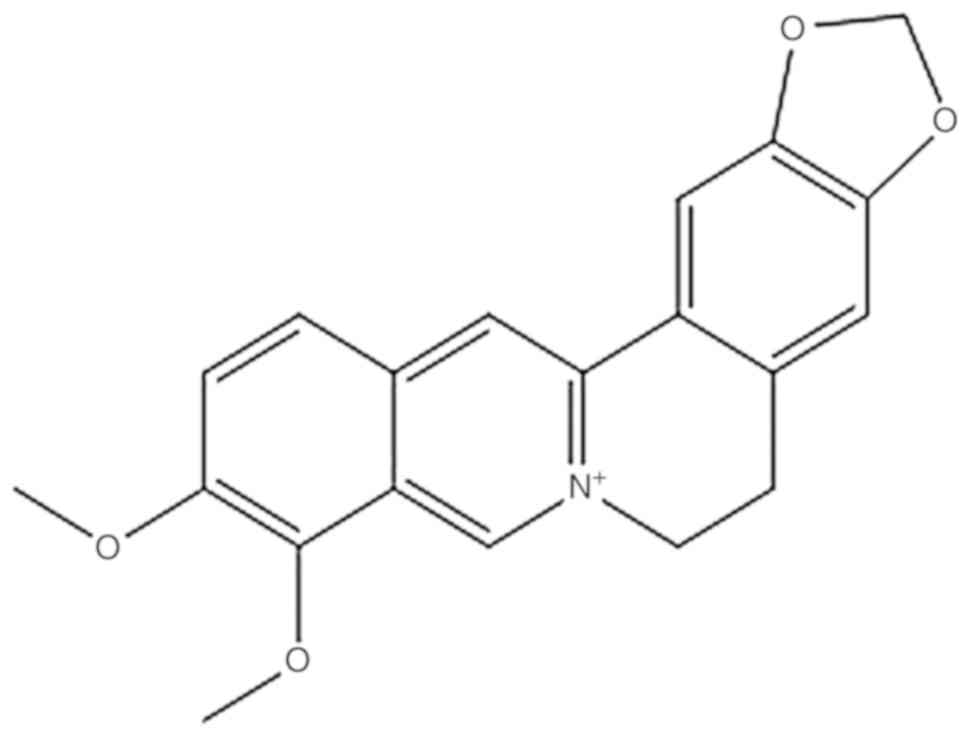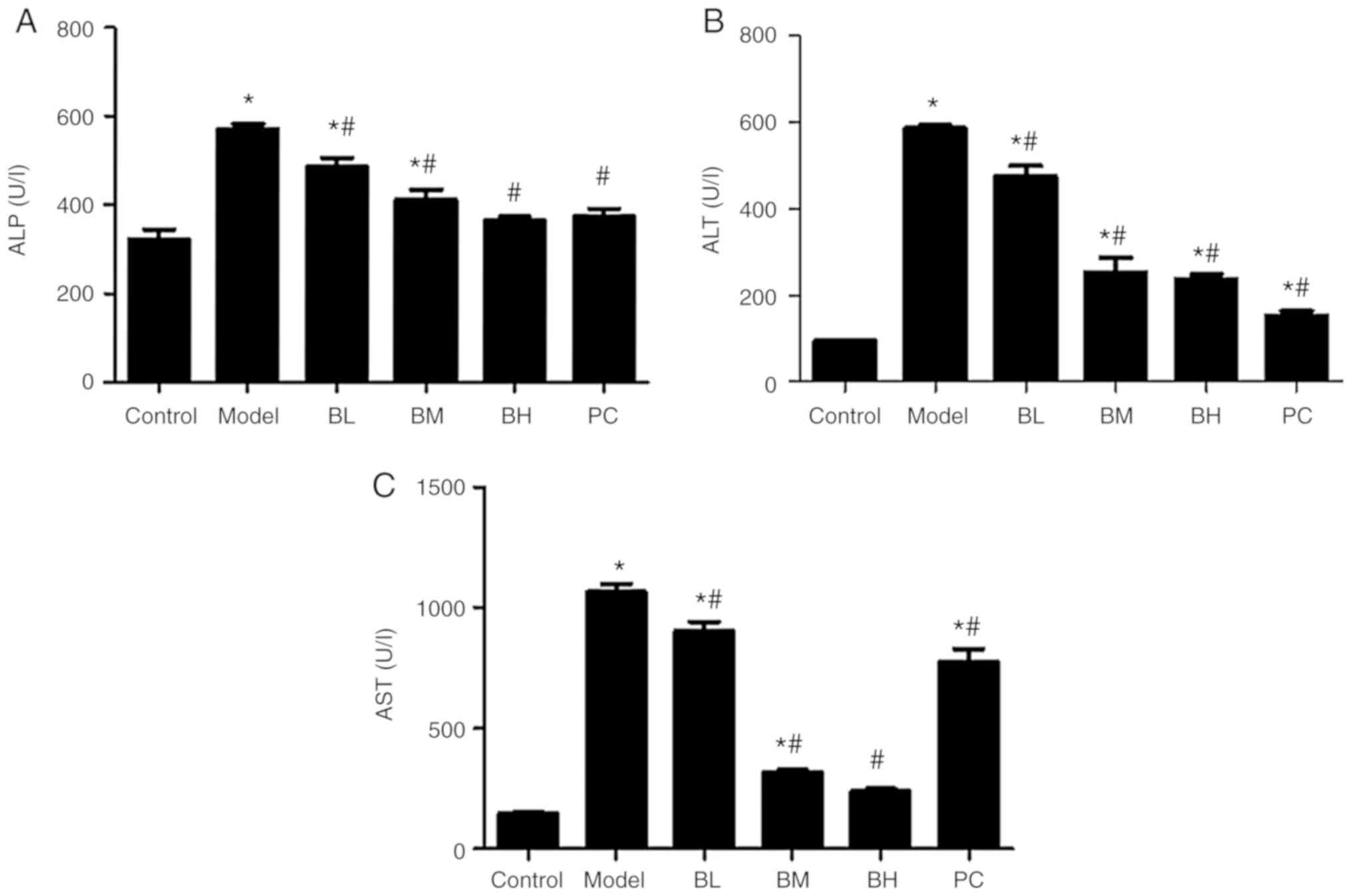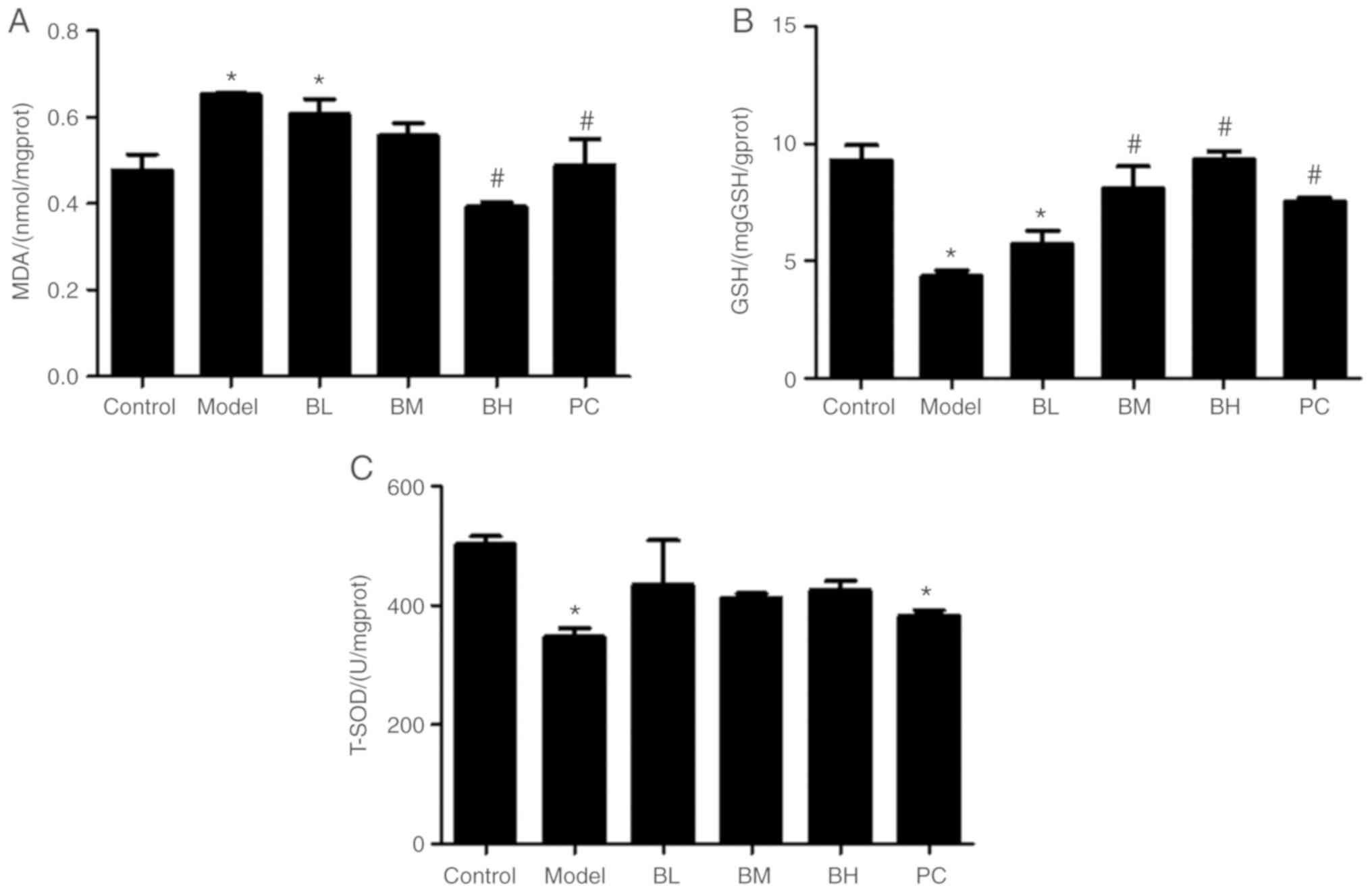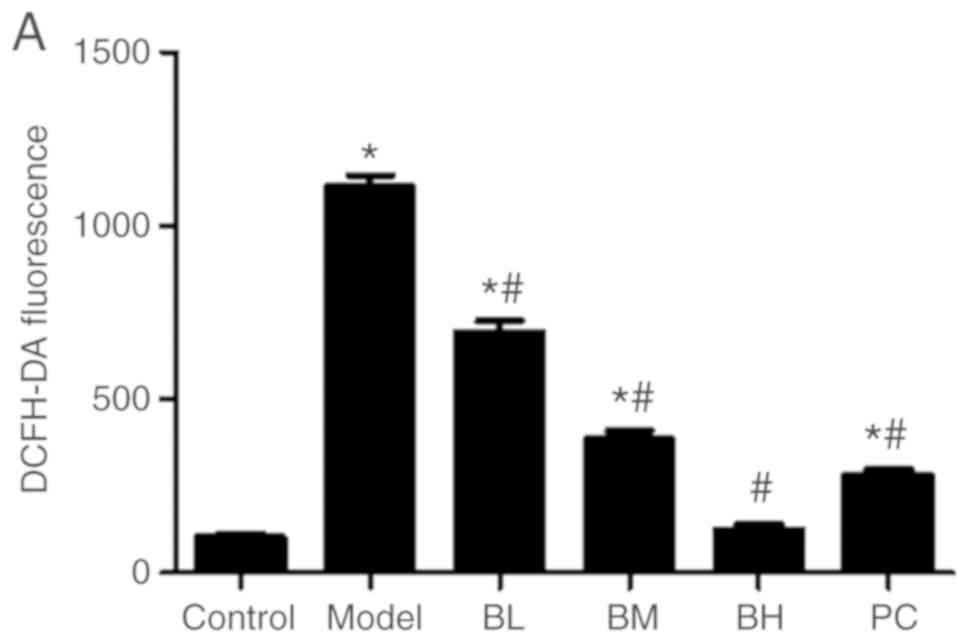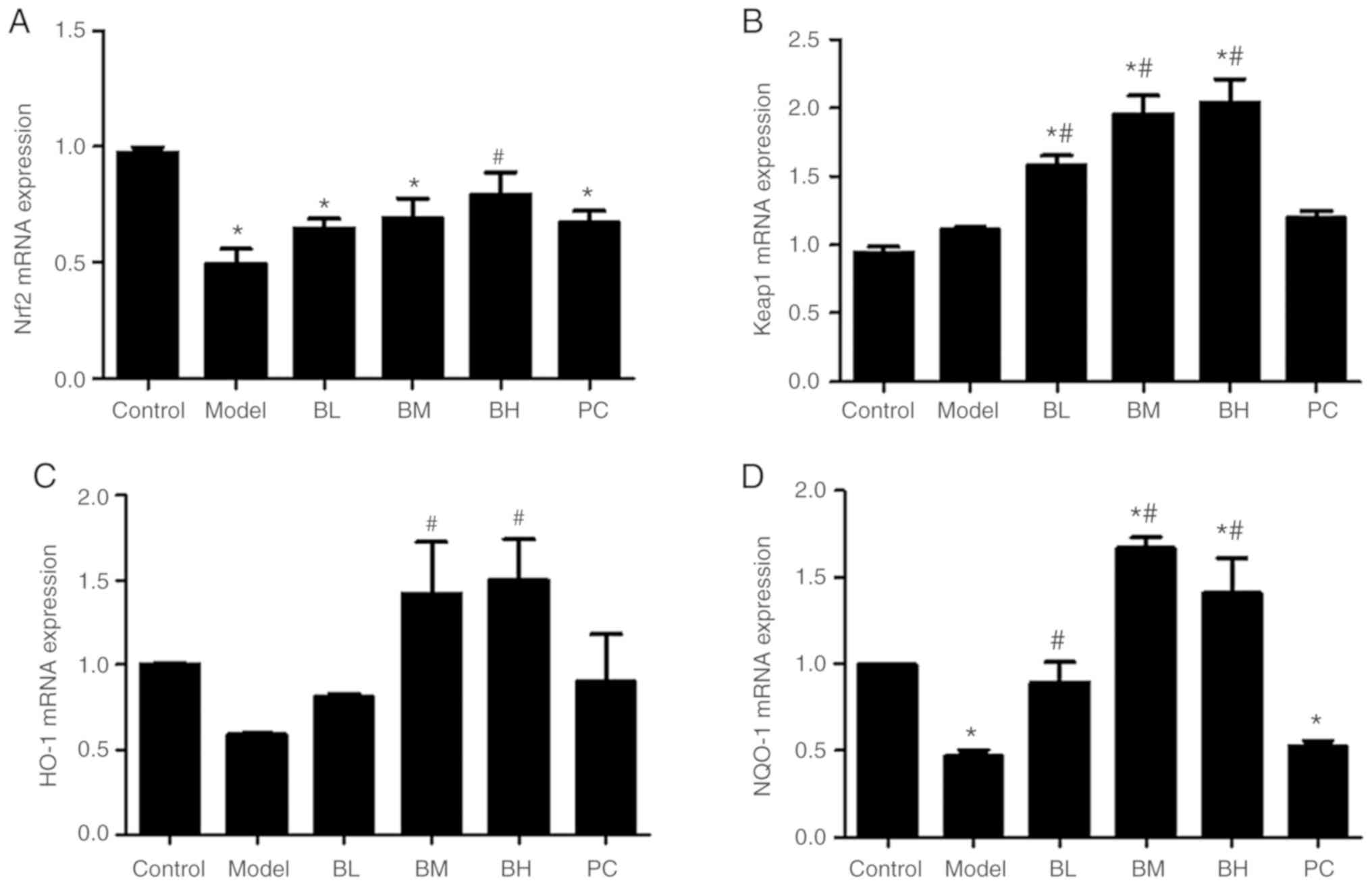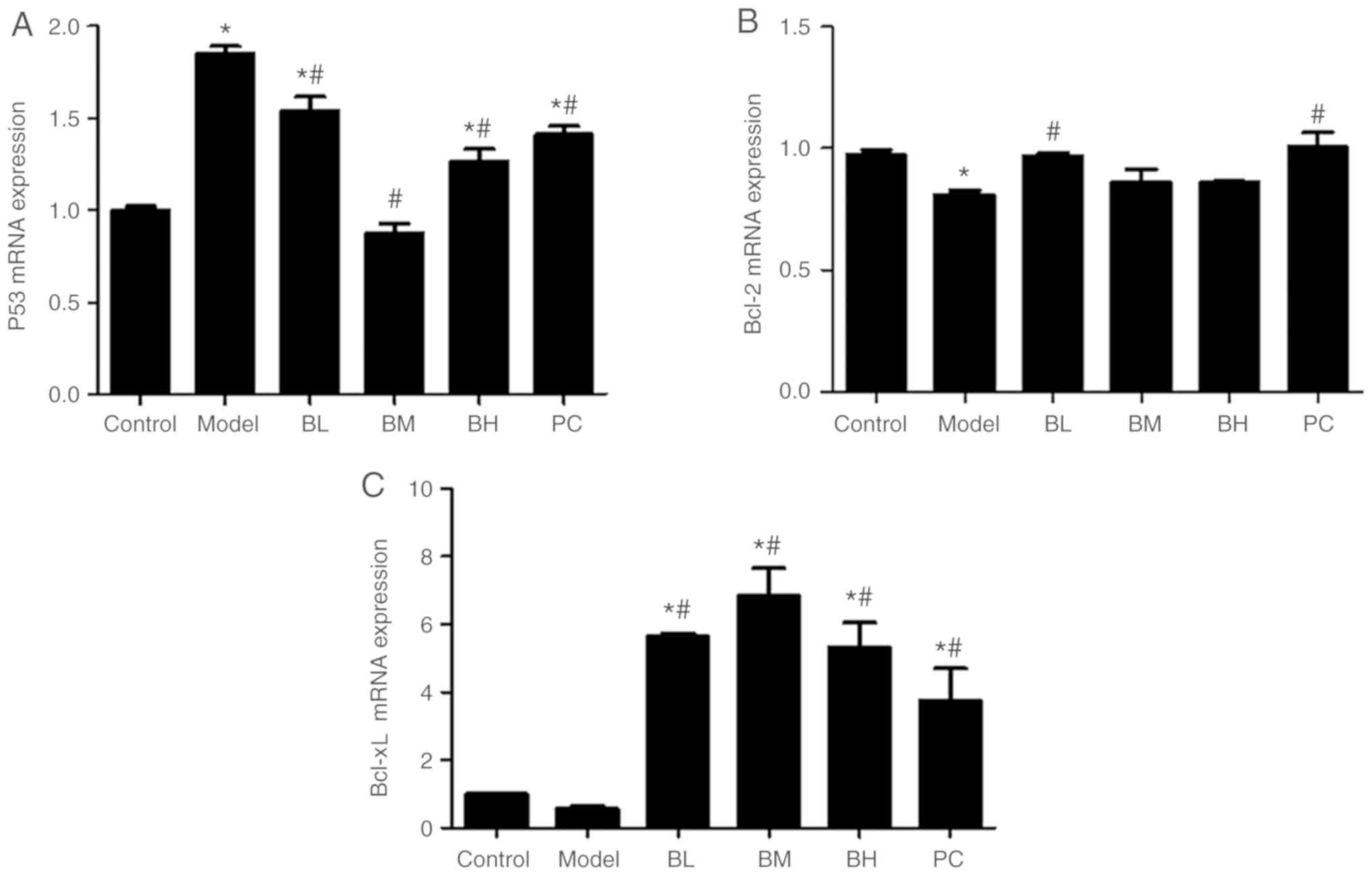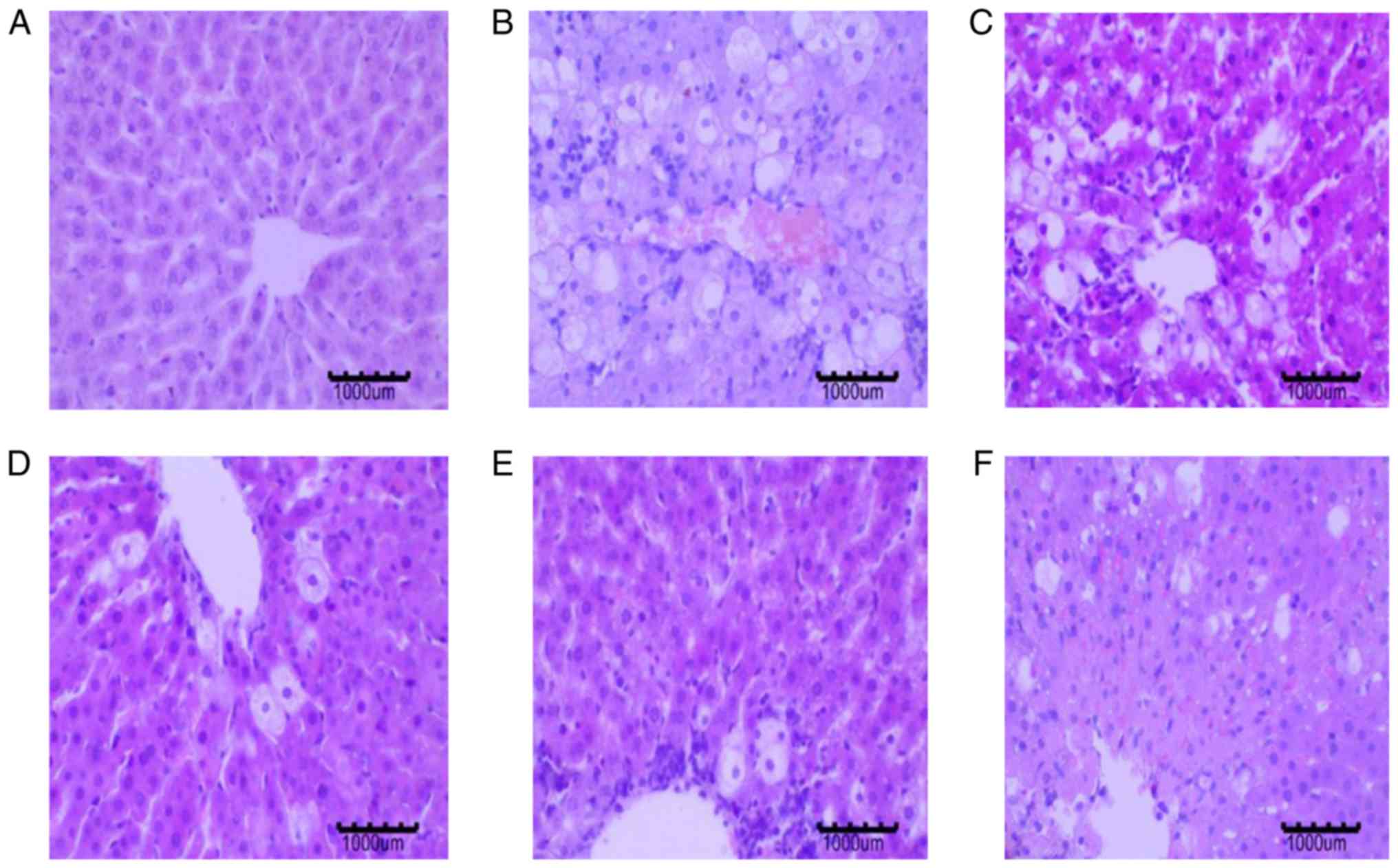|
1
|
Shin DS, Kim KW, Chung HY, Yoon S and Moon
JO: Effect of sinapic acid against carbon tetrachloride-induced
acute hepatic injury in rats. Arch Pharm Res. 36:626–633. 2013.
View Article : Google Scholar : PubMed/NCBI
|
|
2
|
Imanshahidi M and Hosseinzadeh H:
Pharmacological and therapeutic effects of Berberis vulgaris and
its active constituent, berberine. Phytother Res. 22:999–1012.
2008. View
Article : Google Scholar : PubMed/NCBI
|
|
3
|
Jiang Q, Liu P, Wu X, Liu W, Shen X, Lan
T, Xu S, Peng J, Xie X and Huang H: Berberine attenuates
lipopolysaccharide-induced extracelluar matrix accumulation and
inflammation in rat mesangial cells: Involvement of NF-κB signaling
pathway. Mol Cell Endocrinol. 331:34–40. 2011. View Article : Google Scholar : PubMed/NCBI
|
|
4
|
Hasanein P, Ghafari-Vahed M and Khodadadi
I: Effects of isoquinoline alkaloid berberine on lipid
peroxidation, antioxidant defense system, and liver damage induced
by lead acetate in rats. Redox Rep. 22:42–50. 2017. View Article : Google Scholar : PubMed/NCBI
|
|
5
|
Liu RY and Chen CT: In vitro antibacterial
activity assay of 8 herbs (including Coptis chinensis) on
several conditional pathogenic bacteria that often cause nosocomial
infection. J Fujian Univ Tradit Chin Med. 14:26–28. 2004.(In
Chinese).
|
|
6
|
Chen FL, Yang ZH, Liu Y, Li LX, Liang WC,
Wang XC, Zhou WB, Yang YH and Hu RM: Berberine inhibits the
expression of TNFalpha, MCP-1, and IL-6 in AcLDL-stimulated
macrophages through PPARgamma pathway. Endocrine. 33:331–337. 2008.
View Article : Google Scholar : PubMed/NCBI
|
|
7
|
Gu M, Xu J, Han C, Kang Y, Liu T, He Y,
Huang Y and Lic C: Effects of Berberine on cell cycle, DNA,
reactive oxygen species and apoptosis in L929 murine fibroblast
cells. Evid Based Complement Alternat Med. 2015:7963062015.
View Article : Google Scholar : PubMed/NCBI
|
|
8
|
Livak KJ and Schmittgen TD: Analysis of
relative gene expression data using real-time quantitative PCR and
the 2(-Delta Delta C(T)) method. Methods. 25:402–408. 2001.
View Article : Google Scholar : PubMed/NCBI
|
|
9
|
Chang ML, Yeh CT, Chang PY and Chen JC:
Comparison of murine cirrhosis models induced by hepatotoxin
administration and common bile duct ligation. World J
Gastroenterol. 11:4167–4172. 2005. View Article : Google Scholar : PubMed/NCBI
|
|
10
|
Liu Y, Zheng D, Su L, Wang Q and Li Y:
Protective effect of polysaccharide from Agaricus bisporus in Tibet
area of China against tetrachloride-induced acute liver injury in
mice. Int J Biol Macromol. 118:1488–1493. 2018. View Article : Google Scholar : PubMed/NCBI
|
|
11
|
Wang YZ: The protective effect of
polysaccharide of Grifola frondosa on carbon
tetrachloride-induced liver injury and its mechanismShandong Univ;
2010
|
|
12
|
Dong D, Zhang S, Yin L, Tang X, Xu Y, Han
X, Qi Y and Peng J: Protective effects of the total saponins from
Rosa laevigata Michx fruit against carbon
tetrachloride-induced acute liver injury in mice. Food Chem
Toxicol. 62:120–130. 2013. View Article : Google Scholar : PubMed/NCBI
|
|
13
|
Huang QX: Relationship between hepatic
stellate cells and inflammation. Internal Med. 2:978–979. 2007.
|
|
14
|
Zhang HY, Li XW, Yao XL and Zhu JX:
Progress in molecular mechanism and traditional chinese medicine
pharmacology for liver injury. Tradit Chin Drug Res Clin Pharmacol.
27:448–455. 2016.(In Chinese).
|
|
15
|
Lee CH, Park SW, Kim YS, Kang SS, Kim JA,
Lee SH and Lee SM: Protective mechanism of glycyrrhizin on acute
liver injury induced by carbon tetrachloride in mice. Biol Pharm
Bull. 30:1898–1904. 2007. View Article : Google Scholar : PubMed/NCBI
|
|
16
|
Gan D, Ma L, Jiang C, Wang M and Zeng X:
An international journal published for the british industrial
biological research association. Food Chem Toxicol. 50:2681–2688.
2012. View Article : Google Scholar : PubMed/NCBI
|
|
17
|
Liu LP, Tao XF, Han X and Xu L: Research
progress in the inhibitory effect of traditional chinese medicine
on carbon tetrachloride induced acute liver injury. China
Pharmacist. 20:1638–1642. 2017.
|
|
18
|
Stadler RH, Blank I, Varga N, Robert F,
Hau J, Guy PA, Robert MC and Riediker S: Acrylamide from maillard
reaction products. Nature. 419:449–450. 2002. View Article : Google Scholar : PubMed/NCBI
|
|
19
|
Radu CD, Salariu M, Avadanei M, Ghiciuc C,
Foia L and Elena CL: Carbohydrate Polymers. 1981.
|
|
20
|
Suji G and Sivakami S: Malondialdehyde, a
lipid-derived aldehyde alters the reactivity of Cys34 and the
esterase activity of serum albumin. Toxicol In Vitro. 22:618–624.
2008. View Article : Google Scholar : PubMed/NCBI
|
|
21
|
Kundu JK and Surh YJ: Nrf2-Keap1 signaling
as a potential target for chemoprevention of
inflammation-associated carcinogenesis. Pharm Res. 27:999–1013.
2010. View Article : Google Scholar : PubMed/NCBI
|
|
22
|
Hou Y, Wang Y, He Q, Li L, Xie H, Zhao Y
and Zhao J: Nrf2 inhibits NLRP3 inflammasome activation through
regulating Trx1/TXNIP complex in cerebral ischemia reperfusion
injury. Behav Brain Res. 336:32–39. 2018. View Article : Google Scholar : PubMed/NCBI
|
|
23
|
Li L, Dong H, Song E, Xu X, Liu L and Song
Y: Nrf2/ARE pathway activation, HO-1 and NQO1 induction by
polychlorinated biphenyl quinone is associated with reactive oxygen
species and PI3K/AKT signaling. Chem Biol Interact. 209:56–67.
2014. View Article : Google Scholar : PubMed/NCBI
|
|
24
|
Hsu YY, Chen CS, Wu SN, Jong YJ and Lo YC:
Berberine activates Nrf2 nuclear translocation and protects against
oxidative damage via a phosphatidylinositol 3-kinase/Akt-dependent
mechanism in NSC34 motor neuron-like cells. Eur J Pharm Sci.
46:415–425. 2012. View Article : Google Scholar : PubMed/NCBI
|
|
25
|
Chen JH, Huang SM, Tan TW, Lin HY, Chen
PY, Yeh WL, Chou SC, Tsai CF, Wei IH and Lu DY: Berberine induces
heme oxygenase-1 up-regulation through phosphatidylinositol
3-kinase/AKT and NF-E2-related factor-2 signaling pathway in
astrocytes. Int Immunopharmacol. 12:94–100. 2012. View Article : Google Scholar : PubMed/NCBI
|
|
26
|
Zhang C, Li C, Chen S, Li Z, Jia X, Wang
K, Bao J, Liang Y, Wang X, Chen M, et al: Berberine protects
against 6-OHDA-induced neurotoxicity in PC12 cells and zebrafish
through hormetic mechanisms involving PI3K/AKT/Bcl-2 and Nrf2/HO-1
pathways. Redox Biol. 11:1–11. 2017. View Article : Google Scholar : PubMed/NCBI
|
|
27
|
Kuwana T, Mackey MR, Perkins G, Ellisman
MH, Latterich M, Schneiter R, Green DR and Newmeyer DD: Bid, Bax,
and lipids cooperate to form supramolecular openings in the outer
mitochondrial membrane. Cell. 111:331–342. 2002. View Article : Google Scholar : PubMed/NCBI
|
|
28
|
Baek JH, Jang JE, Kang CM, Chung HY, Kim
ND and Kim KW: Hypoxia-induced VEGF enhances tumor survivability
via suppression of serum deprivation-induced apoptosis. Oncogene.
19:4621–4631. 2000. View Article : Google Scholar : PubMed/NCBI
|
|
29
|
Tiwari M, Tripathi A and Chaube SK:
Presence of encircling granulosa cells protects against oxidative
stress-induced apoptosis in rat eggs cultured in vitro. Apoptosis.
22:98–107. 2017. View Article : Google Scholar : PubMed/NCBI
|
|
30
|
Sha SM, Zhang YG, Xu B, Wang HL, Kong XY
and Wu KC: Effect of Berberine on cell proliferation and apoptosis
in gastric carcinoma cells. J Mod Oncol. 19:629–633. 2011.
|















